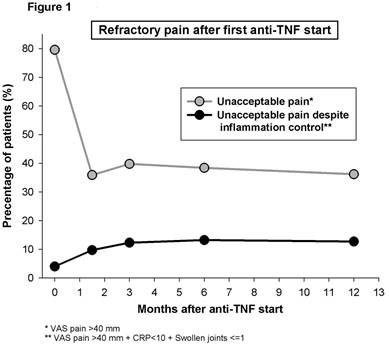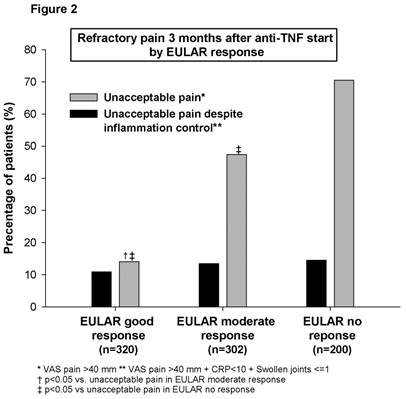Session Information
Date: Sunday, November 5, 2017
Title: Rheumatoid Arthritis – Clinical Aspects Poster I: Treatment Patterns and Response
Session Type: ACR Poster Session A
Session Time: 9:00AM-11:00AM
Background/Purpose: Pain is a dominant and debilitating feature of RA, but while a lot of focus has been put on the occurrence and management of inflammatory pain, less is reported on pain despite low inflammation. The aim of this study was therefore to investigate the prevalence of refractory pain in spite of inflammation control after start of a first anti-TNF therapy in RA patients and its relation to EULAR treatment response.
Methods: RA patients starting a first anti-TNF therapy 2004-2010 were identified in the prospective, observational South Swedish Arthritis Group register (n=1166; 76% women; >95% fulfillment of 1987 ACR criteria) with mean age 56 years and mean disease duration 10 years. Unacceptable pain (>40 mm on a Visual Analogue Scale, VAS; scale 0-100 mm)1 and unacceptable pain in spite of inflammation control (VAS pain>40 mm combined with CRP<10 mg/L,2 and ≤1 swollen joint) were assessed 1.5, 3, 6, and 12 months after treatment start. Furthermore, analyses were performed in relation to EULAR treatment response after 3 months (good response, moderate, no). Differences in pain measures between treatment response groups were estimated by logistic regression.
Results: At start of first anti-TNF therapy, 79.6% of the RA patients had unacceptable pain (VAS pain>40) which declined to 39.8% after 3 months, and then remained stable during the first treatment year, whereas the frequency of patients with unacceptable pain in spite of inflammation control increased from 4.0% at treatment start to 12.3% after 3 months, and then stabilized (Figure 1). Unacceptable pain at 3 months was strongly related to EULAR response (14.1% of good responders vs. 70.5% of non-responders; p<0.001). In contrast, the frequency of unacceptable pain in spite of inflammation control was largely similar in patients with good response and those with no response (10.9% vs. 14.4%; p=0.23). Among EULAR good responders, unacceptable pain despite inflammation control constituted 78% of all unacceptable pain at 3 months (Figure 2).
Conclusion: A substantial proportion of RA patients starting anti-TNF therapy have refractory, unacceptable pain in spite of good inflammation control during the first treatment year. In the present study, this pain status was as common in EULAR good responders as in non-responders. These data are in line with insufficient effects of biologics on a subgroup of patients with inflammation-independent pain, and strongly warrants alternative treatment strategies in these patients.
To cite this abstract in AMA style:
Olofsson T, Wallman JK, Schelin ME, Jöud A, Lampa J. Refractory Pain in Spite of Inflammation Control after Start of Anti-TNF Therapy in RA: Observational Data from Southern Sweden [abstract]. Arthritis Rheumatol. 2017; 69 (suppl 10). https://acrabstracts.org/abstract/refractory-pain-in-spite-of-inflammation-control-after-start-of-anti-tnf-therapy-in-ra-observational-data-from-southern-sweden/. Accessed .« Back to 2017 ACR/ARHP Annual Meeting
ACR Meeting Abstracts - https://acrabstracts.org/abstract/refractory-pain-in-spite-of-inflammation-control-after-start-of-anti-tnf-therapy-in-ra-observational-data-from-southern-sweden/


